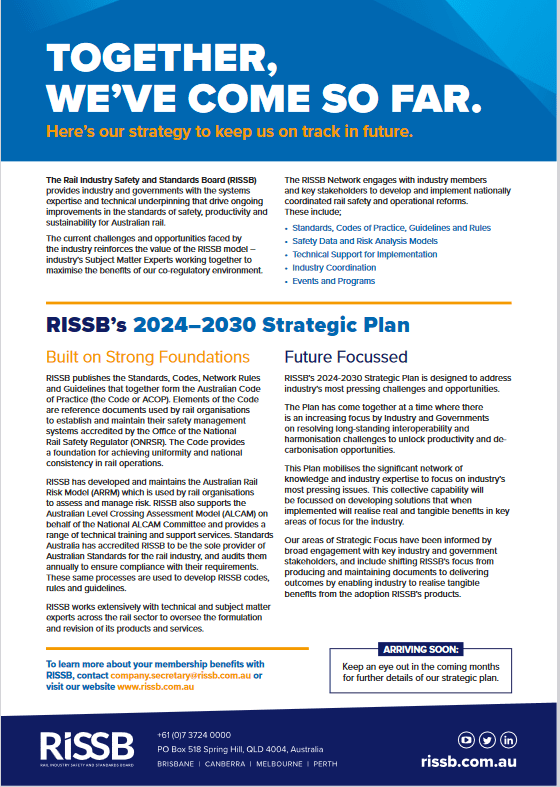Strategic Plan
2024 - 2030RISSB’s 2024-2030 Strategic Plan mobilises the significant network of knowledge and industry expertise to focus on industry’s most pressing issues. This collective capability will be focussed on developing solutions that when implemented, will realise real and tangible benefits in key areas of focus for the industry.
The foundation of the Plan has been formed by seeking the views of industry leaders on the future direction of RISSB. It comes at a time when there is an increasing focus by industry and governments on resolving long-standing interoperability and harmonisation challenges to unlock productivity and de-carbonisation opportunities.
The Plan is forward looking and focused on ensuring RISSB products and services provide maximum benefit for members and the rail industry more broadly.
View RISSB Work Plan 2024-2025- Set an annual program for the revision of Standards and elements of the Code aligned to industry- wide critical risks and opportunities, concentrating on elements that will deliver high-value solutions aligned to industry and government priorities.
- Further develop the Australian Rail Risk Model (ARRM) based on analytics of industry-wide safety data, and increase the use of it for risk profiling, analysis, and prioritisation, and for developing common solutions to systemic industry risks.
- Reshape ancillary services RISSB offers to include support for implementation, provision of training content and issue of information updates and bulletins based on national and international incidents, developments and trends.
- Co-create and pilot new Standards, Codes, products, and services that provide the technical basis to enable industry to respond to government priorities including interoperability, harmonisation, industry skills development and de-carbonisation.
- Deliver an annual program of improvements to the Australian Level Crossing Assessment Model (ALCAM) with measures that reduce the effort of data collection and input, and increase the effectiveness and value of the model outputs and uses.
- Cultivate RISSB’s collective capability by harnessing member and partner skills, subject matter expertise and experience and embedding it in internal processes and providing a knowledge base that assists members in maintaining their accreditation.
- Set up systems to aggregate and analyse key industry data sets, gather market intelligence and leverage RISSB’s collective capability to identify emerging trends. Embed these learnings in the products and services we deliver.
- Establish formal links with international standards setting organisations to facilitate knowledge transfer on relevant areas of practice, including rapid learning and sharing from incidents.
- Engage with Standards Australia to ensure on-going accreditation systems compliance whilst implementing process improvements to reduce development timeframes and extending the process to include steps to facilitate industry adoption.
- Structure engagement with industry members to understand and respond to critical priorities,
and distilling these inputs to set priorities for the development of RISSB products and to guide the formulation of annual work programs. - Establish mechanisms in our MoU with governments to ensure planning, programs and relationship management support government policy objectives.
- Build our strategic partnerships with key industry bodies including ARA, ONRSR and NTC to ensure our actions, programs and products are aligned and integrated.
RISSB Strategic Plan 2024 - 2030
Annual Report
2022/23 has been a busy and productive year for RISSB, partnering with industry to expand the range of relevant resources for the rail industry, maintaining involvement with the governments’ national rail reform agenda and offering a suite of activities for members and the industry more broadly.
During 2022/23, RISSB continued to engage with key stakeholders including working with government to establish a new Memorandum of Understanding, and based on feedback from industry and other key stakeholders, commenced the development of a new Strategic Plan for RISSB.



